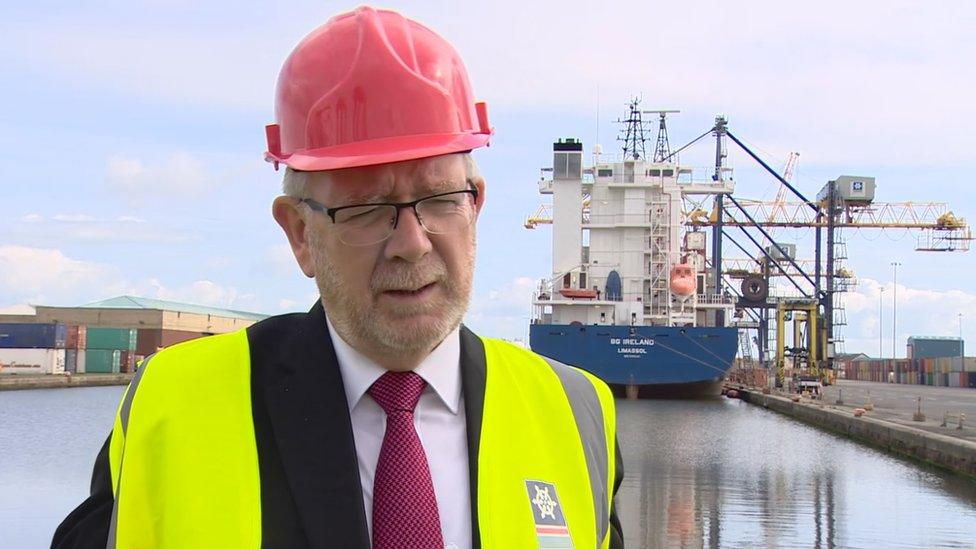Jacob Rees-Mogg: 'No indyref2 for a generation'
- Published
'Any indyref vote should wait 20 years'
Conservative MP Jacob Rees-Mogg has said Scotland is entitled to hold a second independence referendum - but not for at least 20 years.
The Brexiteer also said he did not favour Holyrood having new powers over immigration and trade after the UK leaves the EU.
The Scottish government considers those powers to be essential.
The SNP said there could be a second referendum if there was a "significant material change in circumstances".
Mr Rees-Mogg, who unsuccessfully stood for election in Central Fife in 1997, spoke to the BBC while on a short speaking tour of Scotland.
He said any future vote on independence should wait a generation.
"Of course Scotland is entitled to have another referendum at some point in the future, but I think the SNP's position of a generation is a reasonable one," he said.
"It should be a generational decision, and a generational decision is not made over two or three years. A generation is somewhere beyond 20 years."
He also said that giving the Scottish government powers over immigration and trade would be "very difficult".
'Complex issue'
He said: "There are some powers held by the European Union that will inevitably flow down to the devolved parliaments or assemblies.
"Whether it's possible to do it on trade is a more complex issue because those are international treaties that affect the whole of the United Kingdom market and it would be difficult to do on a devolved basis.
"The principle that powers that come from Brussels should, as far as possible, go to the constituent parts of the United Kingdom is a good one but that won't be possible for everything."

Mike Russell said trust in Jacob Rees-Mogg had "evaporated a long time ago"
He added: "To do it for immigration would be really difficult because once people had come into Scotland, how would you limit their ability to go around the rest of the country?
"We certainly don't want to be the sort of country that has internal controls or identify cards. I think that would undermine some of our most ancient freedoms."
The Somerset MP, who favours a clean break from the EU, said he thought a Brexit deal was looking "more likely".
"On a democratic basis the decision [to leave the EU] is as valid for Scotland as it is for the rest of the UK," he said.
He also said it was "crucial" that the government achieved a really good deal on fishing to help the Scottish economy.
Mr Rees-Mogg said he believed Theresa May would still be prime minister in a year.
He said there was no "serious prospect" of him replacing her but tipped Scottish party leader Ruth Davidson as a future UK Tory leader.
"I think Ruth Davidson is a brilliant, charismatic and capable political figure," he said. "She would, at some future date, make a wonderful leader, both as first minister of Scotland and, in due course, leader of the Conservative party in England. She is a wonderful, capable person," he said.
Mr Rees-Mogg was also asked about Scottish government economic analysis showing that a no-deal Brexit would result in an 8.5% fall in Scotland's GDP, and that all forms of Brexit would cause harm to the Scottish economy.
He replied: "These forecasts are predicated are based on the political outlook of the people commissioning the forecasts.
"They're not in any sense properly independent."
A spokeswoman for the SNP said: "The fact that right-wing extreme Brexiteer Tories like Jacob Rees-Mogg are seeking to dictate to the people of Scotland shows exactly why decisions about Scotland should be taken in Scotland and not at Westminster.
"Not only does Jacob Rees-Mogg back Brexit, he is also against allowing Scotland to chart our own course to mitigate the worst effects of Brexit.
"The SNP's 2016 manifesto clearly set out the case for a second independence referendum if there was a 'significant material change in circumstances that prevailed in 2014, such as Scotland being taken out of the EU against our will' - a position that has subsequently been backed by a majority of MSPs in the Scottish Parliament."
'Listen to the people'
Holyrood's constitution secretary, Mike Russell, said Scotland had lost trust in politicians like Mr Rees-Mogg.
He told BBC Scotland: "Trust in politics and trust in Jacob Rees-Mogg and Boris Johnson evaporated a long time ago, given the way that the [Brexit] referendum was run and given their antics since then.
"The way to restore trust in politics is to listen to the people and in Scotland that means to represent the people in Scotland who said 'we don't want to leave'.
"I think what we're heading for is a continued stalemate.
"It's difficult to see how the prime minister can move from the Chequers position without alienating even more of her party but she can't get a deal if she sticks to the Chequers position. And that will be the big issue of the autumn."